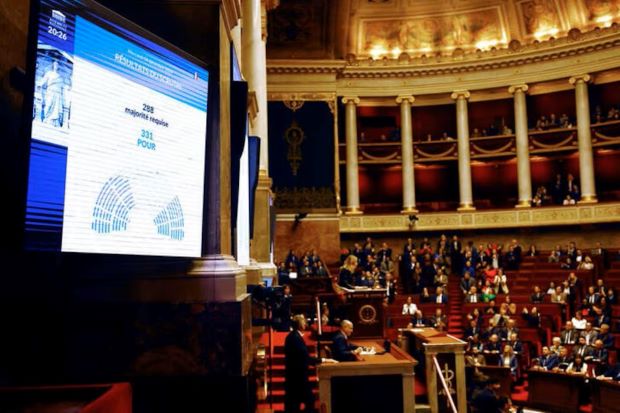Macron seeks new PM as government resignation looms

By Dominique Vidalon and Lucien Libert
PARIS – French President Emmanuel Macron was meeting allies and senior politicians on Thursday (5) as he sought to swiftly appoint a new prime minister, a day after far-right and leftist lawmakers toppled Michel Barnier’s minority government.
Francois Bayrou, whose name is often cited by French media as a possible successor to Barnier, was due to have lunch with Macron, Le Parisien newspaper and other media reported. Bayrou is a veteran centrist politician and a close Macron ally.
Outgoing defence minister Sebastien Lecornu is also cited as a possible candidate for prime minister. There was no word yet of a possible Macron meeting with him.
Three sources told Reuters on Wednesday (4) that Macron aimed to appoint a replacement swiftly, with one saying he wanted to do so before a ceremony on Saturday (7) to reopen Notre Dame Cathedral – renovated after a devastating fire. US President-elect Donald Trump is among world leaders expected to attend.
Allies in Macron’s own camp joined the chorus urging swift action. After the late June and early July snap elections, it took Macron nearly two months to appoint Barnier.
“I recommend that he proceed quickly to the appointment of a prime minister, it’s important, we must not leave things up in the air,” National Assembly president Yael Braun-Pivet told France Inter radio before meeting Macron around noon.
Macron, who is due to give a televised address to the nation at 8:00 p.m. (1900 GMT), will also meet the head of the Senate at 1400 GMT, French media said.
Barnier, a veteran conservative who became prime minister barely three months ago, will become the shortest-serving prime minister in modern French history when Macron approves his resignation.
The two men met for over an hour on Thursday morning, French media said. Barnier had been due to hand in his resignation during that meeting but there was still no official confirmation after he left the Elysee presidential palace.
Turmoil
The political turmoil in France further weakens a European Union already reeling from the implosion of Germany’s coalition government and comes just weeks before Trump returns to the White House.
Any new prime minister will face the same challenges that led to Barnier’s downfall, notably pushing the 2025 budget through a deeply divided parliament at a time when France needs to fix ailing public finances.
“This is the logical conclusion of what France and its lawmakers are at the moment: a mess,” 75-year-old Parisian Paulo told Reuters, commenting on the latest developments.
Macron precipitated the current crisis with an ill-fated decision to call the snap election in June. He has a mandate until 2027 but faces growing calls to resign.
“The main culprit for the current situation is Emmanuel Macron,” Marine Le Pen of the far-right National Rally (RN) told TF1 TV late on Wednesday (3).
A French president cannot be pushed out unless two-thirds of lawmakers decide he has gravely failed to fulfil his role, according to a never-yet-invoked article of the constitution.
Some 64% of voters want Macron to resign, according to the Toluna Harris Interactive poll for RTL broadcaster. A small majority of voters approve of parliament bringing down Barnier, but many are worried about its economic and political consequences, the poll showed.
Under French constitutional rules, there can be no new parliamentary election before July.
“Until potential new elections, ongoing political uncertainty is likely to keep the risk premium on French assets elevated,” SocGen analysts said in a note. “Political uncertainty is likely to dampen both investment and consumer spending.”
The political uncertainty has been unnerving investors in French sovereign bonds and stocks for weeks.
French bonds and stocks rallied on Thursday on what some traders said was profit-taking following the widely expected outcome of the no-confidence vote. But the relief rally is unlikely to last, given the scale of political uncertainty.
The fall of France’s government leaves the country without a clear path towards reducing its fiscal deficit and the most likely outcome is less belt-tightening than previously planned, credit rating agency Standard and Poor’s (S&P) said.
-Reuters


Comments are closed, but trackbacks and pingbacks are open.